‘This is our home’: D-day for Afghans facing Pakistan deportation
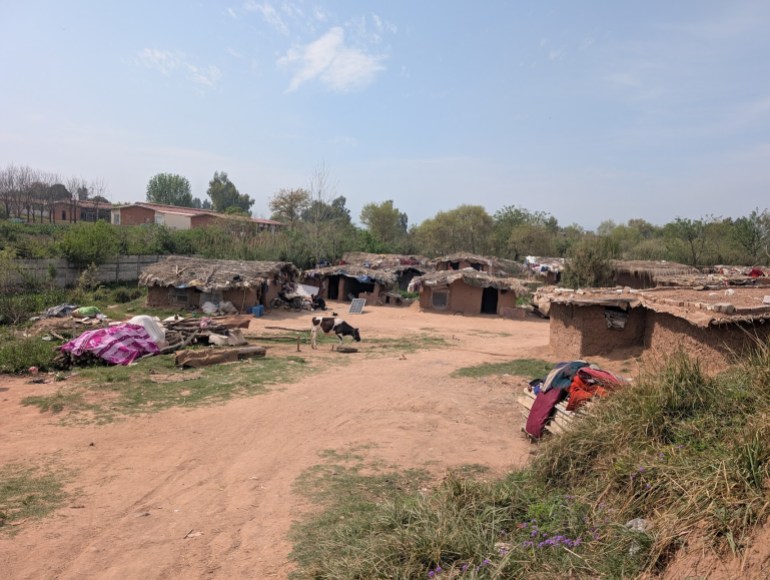
Islamabad, Pakistan – Pakistan is the only home Mohammad Laal Khan has known. He was born here. He married here. His children were born here. He buried his eldest brother here. But a late-night police raid in November last year shattered his sense of belonging. Khan was born in South Waziristan, a tribal district in Khyber Pakhtunkhwa, a few years after his parents fled the Soviet invasion of Afghanistan. Since the 1990s, the family — including Khan’s mother, four brothers, their families, and other relatives — has lived in the suburbs of Pakistan’s capital Islamabad in mud-plastered houses without electricity or other basic utilities. Now he is on Pakistan’s list for deportation. “It is as if being an Afghan is a curse upon our existence,” Khan, 36, told Al Jazeera on a recent March afternoon in the same room where dozens of police officers had stormed in, threatening to take away all the men. Khan says, despite much pleading, four of his brothers were taken away and charged with living in the country “illegally”. Their ordeal ended after two weeks when a court granted them bail. Advertisement The entire family possesses Afghan Citizenship Cards (ACC), a government-sanctioned identification document issued to Afghan citizens living in Pakistan. But over the past two years, between September 2023 and February 2025, a systemic government crackdown on Afghan nationals has resulted in the expulsion of nearly 850,000 Afghans from Pakistan, including women and children. Now, hundreds of thousands of ACC-holding Afghans like Khan, having spent almost their entire lives in Pakistan, face expulsion from April 1. “We don’t know anything about Afghanistan. We have lived here all our lives, made friends here, built our businesses here. If the government insists on throwing us out, we will leave, but we will return once again,” Khan said. “This is our home.” Pakistan’s deportation plan Pakistan currently hosts more than 2.5 million Afghans, according to government estimates. Among them, about 1.3 million possess a Proof of Registration (PoR) card, first introduced in 2006 and issued by the United Nations refugee agency, UNHCR, while another 800,000 hold an ACC, issued in 2017. These documents were previously recognised as proof of legitimate residence in Pakistan. Not any more. In a two-page document issued in January, Prime Minister Shehbaz Sharif’s office outlined a three-phase “relocation” plan. The first phase targets the deportation of all Afghans now viewed as undocumented — including ACC holders. The second phase focuses on PoR cardholders, who have been granted relief to stay until June 2025. The final phase will address Afghan citizens who are awaiting relocation to third countries. Advertisement Minister of State for Interior Talal Chaudhry said the government was firm in its stance, despite pleas from the UNHCR and global rights organisations such as Human Rights Watch (HRW) and Amnesty International. “We have hosted Afghans in the country for four decades, showing our hospitality and generosity, but it cannot continue indefinitely. They will have to return,” he told Al Jazeera. With the start of this new wave of deportations slated for around Eid — Pakistan celebrates the otherwise festive occasion on March 31 — the deadline has prompted criticism. Many see it as an effort to wrongfully demonise Afghan nationals by linking them to criminal activities. In recent years, Pakistan has suffered from a series of deadly attacks by armed groups that Islamabad alleges operate from Afghanistan. This has also led to a spike in tensions between Pakistan and Afghanistan’s Taliban rulers. “Pakistani officials should immediately stop coercing Afghans to return home and give those facing expulsion the opportunity to seek protection,” said Elaine Pearson, Asia director at HRW, in a March 19 statement. Calling the deadline “unyielding and cruel”, Amnesty International also urged Pakistan to reconsider its decision. “These opaque executive orders contravene the government’s own promises and repeated calls by human rights organizations to uphold the rights of Afghan refugees and asylum seekers,” said Isabelle Lassee, deputy regional director for South Asia at Amnesty International, in a March 26 statement. Advertisement But echoing Chaudhry’s sentiments, Pakistan’s Ministry of Foreign Affairs has insisted that the government had “fulfilled its obligations” by hosting Afghans and was not bound to consult the UNHCR. However, Qaiser Afridi, the spokesperson for the UNHCR, said they are concerned that among the ACC holders, there may be some individuals who may require international protection. “We are urging the government to see their situation through a humanitarian lens. We also call for engagement between Pakistan and Afghanistan so that their return can be dignified and voluntary,” Afridi told Al Jazeera. That alone, Afridi said, would ensure that “reintegration in Afghanistan is sustainable”. Mohammad Laal Khan and his family members live in an informal settlement in the suburbs of Islamabad, where they do not have any amenities [Abid Hussain/Al Jazeera] ‘Why are we being pushed away?’ Originally from Kunduz in Afghanistan, Khan’s family relocated to Islamabad in the early 1990s and has lived there ever since. Khan’s room has rough, mud-plastered walls enclosing a modest space with folded mattresses, a simple rug, and a few personal belongings. Sitting quietly in the room was Khan’s mother, Guldana Bibi, 71, with a wrinkled face, deep-set hazel eyes, and a scarf covering her head. “I have lived in this country for four decades. My children, my grandchildren, were all born here. My husband was my last connection to Afghanistan, and he died years ago. Why are we being pushed away?” she said. Advertisement Along with his brothers, Khan ran a wood shuttering business, but twice in the last 10 years – in 2015 and 2023 – they were forced to stop work and sell what they had in their shops due to government crackdowns on Afghans. Khan claims he incurred losses of nearly 1.8 million rupees ($6,400). “People ask why we haven’t done better economically. My response is, how can you when your life is repeatedly uprooted, or you’re forced to pay bribes just to exist?” Khan said, sitting cross-legged with his
Musk hands $1m cheques to voters in Wisconsin judicial race
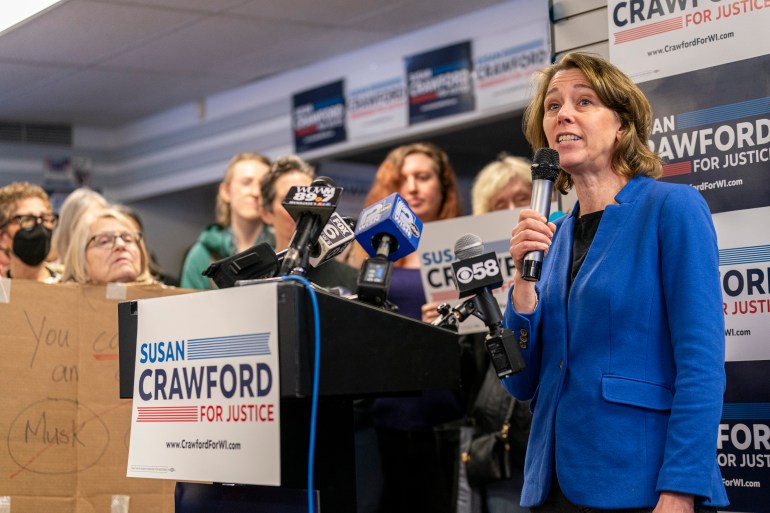
Race for state Supreme Court seat most expensive in US history as billionaire pushes to prevent challenges to Trump’s agenda. Elon Musk has handed $1m cheques to two Wisconsin voters as he promotes a conservative candidate in the state’s upcoming Supreme Court election. The tech billionaire, a close ally of President Donald Trump, handed out the oversized cheques at a rally in Green Bay on Sunday night, increasing the spending in what is already the most expensive judicial race in US history. Musk performed a similar move during November’s presidential election. Democrat rivals in Wisconsin – a contested swing state – have failed in their effort to block the handout by claiming it constitutes election interference. The April 1 election pits conservative candidate Brad Schimel against the Democrats’ Susan Crawford. The liberals currently hold a 4-3 majority on the court. The billionaire has become heavily involved in the judicial election, which is seen as an early referendum on Trump’s controversial first few weeks in the White House. He also insists that liberals will seek to use the Wisconsin court to change voting districts and thus affect future election results in the swing state, should they win. Advertisement In a speech on Sunday evening, Musk told a crowd that the vote was a “super big deal”. “What’s happening on Tuesday is a vote for which party controls the US House of Representatives,” he declared. “Whichever party controls the House … to a significant degree, controls the country, which then steers the course of Western civilisation,” he said, adding that he thinks the vote was “going to affect the entire destiny of humanity”. Wisconsin Supreme Court candidate Susan Crawford addresses a crowd on Saturday, March 29, 2025, at a campaign stop in a field office for the Democratic Party of Wisconsin, in Milwaukee [File: Andy Manis/AP] Earlier, an effort to block the handouts was denied by the Supreme Court. Wisconsin Democrat Attorney General Josh Kaul argued in a filing that the Tesla chief’s actions violate state law. “Wisconsin law prohibits offering anything of value to induce anyone to vote,” Kaul said, adding, “Yet, Elon Musk did just that.” The Supreme Court declined to take the case, without providing a rationale for its decision. Trump agenda The vote comes as the court is expected to rule on abortion rights, union rights, and voting rules, as well as congressional redistricting, potentially affecting the 2026 midterms and the 2028 presidential election. In the short term, the way the court swings is part of Trump’s broader agenda to prevent judicial bodies from blocking his agenda. Numerous legal challenges are under way seeking to halt the president’s controversial actions on immigration, state institutions, and foreign policy. Musk argued that if Crawford was elected it would open the way for a liberal court to “redraw the districts, they will gerrymander the district and deprive Wisconsin of two seats on the Republican side”. Advertisement “Then they will try to stop all the government reforms we are getting done for you, the American people,” he added. Musk also announced that he would pay supporters $20 for every voter they recruit over the next two days. Adblock test (Why?)
French court finds far-right leader Le Pen guilty of embezzlement
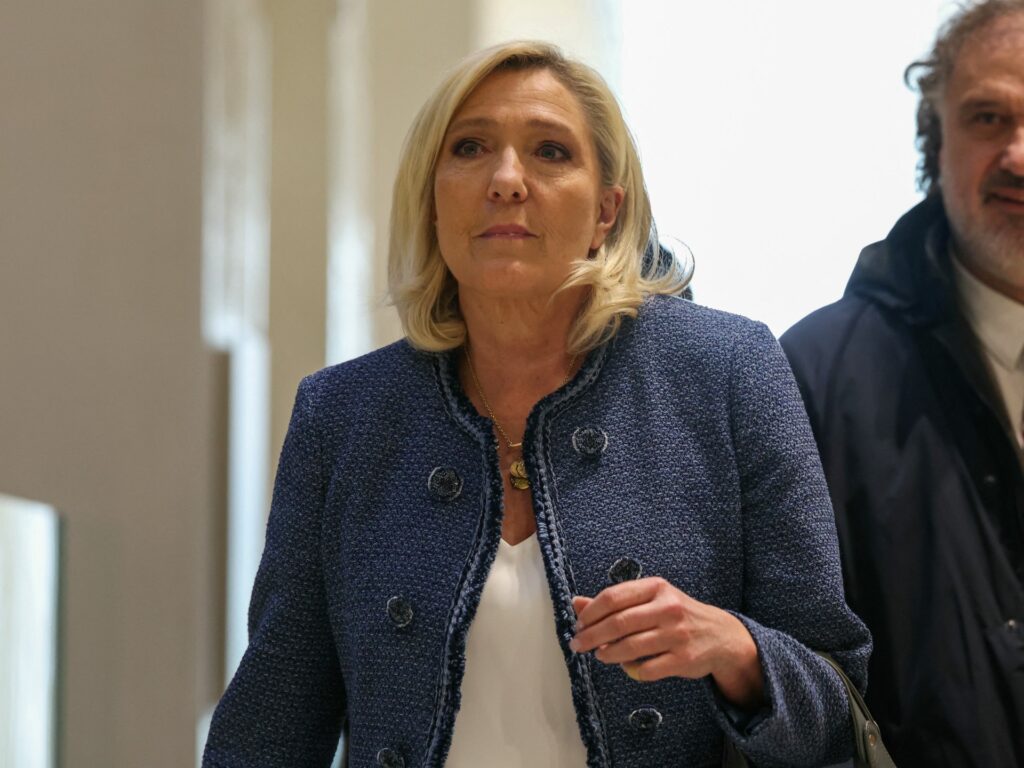
DEVELOPING STORYDEVELOPING STORY, Prosecution demands that Marine Le Pen be barred from office threaten to derail her bid for the presidency in 2027. A French court has found far-right leader Marine Le Pen guilty of embezzling European Union funds. The Paris court ruled that Le Pen used more than 3 million euros ($3.3m) of European Parliament funds to pay members of her National Rally party. The ruling threatens to push the nationalist out of the 2027 presidential race, in which she is currently the frontrunner, according to opinion polls. The sentencing, set to be announced immediately, could see Le Pen declared ineligible to run for office. She has accused prosecutors of seeking her “political death”. A jail sentence and heavy financial penalty are also possible. “If Marine Le Pen can’t run, that would change the landscape of the French far right and its prospects,” said Al Jazeera’s Natacha Butler from the Paris courtroom. “Most likely it would be Jordan Bardella to take her place, the current president of RN. “But he is much younger and not the same kind of dominant force as Marine Le Pen,” she added. “He’s not the figure that so many in France know, and so some say he would likely find it tougher in the 2027 race. Advertisement “Others say a fresh face may be what’s needed.” This is a developing story, more to follow … Adblock test (Why?)
What’s happening to US-European relations?

There are divisions over NATO, the future of Greenland, trade and the Russia-Ukraine war. Relations between the United States and Europe are under severe strain just two months into US President Donald Trump’s second term. There are major divisions over NATO, the Russia-Ukraine war, Greenland and trade – with European leaders scrambling to react. What is driving these differences, and what comes next? Presenter: Adrian Finighan Guests: Niall Stanage – White House columnist at The Hill newspaper Theresa Fallon – Director of the Centre for Russia Europe Asia Studies Steven Erlanger – Chief diplomatic correspondent in Europe for The New York Times Adblock test (Why?)
Israeli air attacks kill dozens in Gaza as Palestinians mark Eid al-Fitr
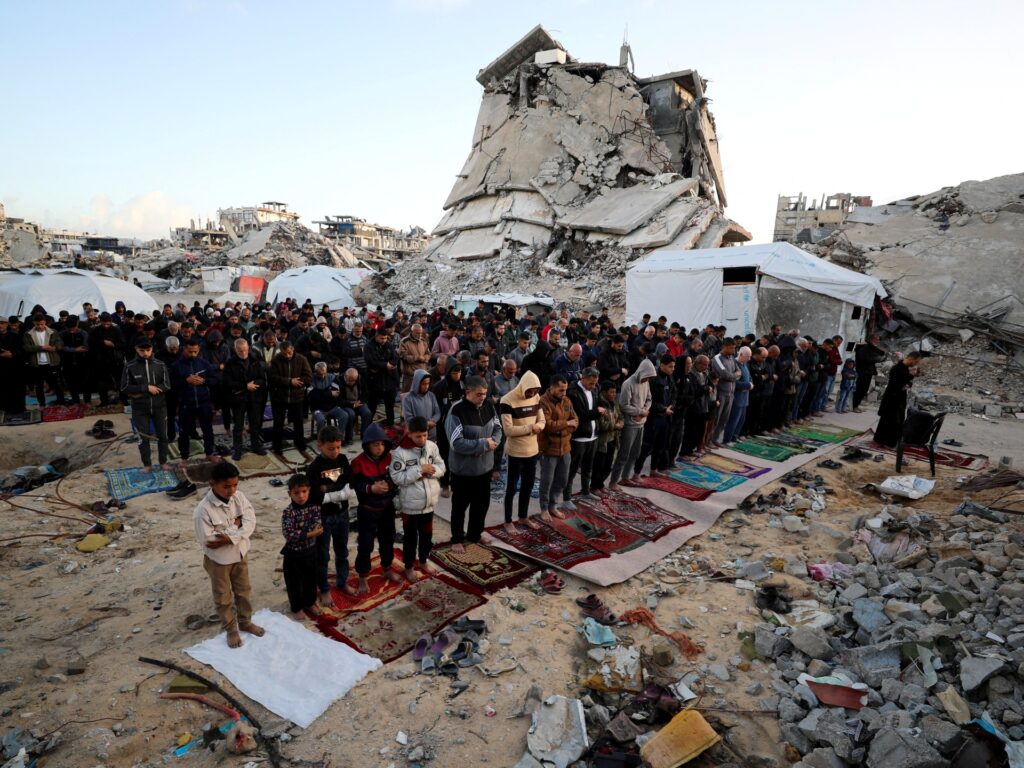
Israeli Prime Minister Benjamin Netanyahu repeats a demand for Hamas to disarm and for its leaders to leave Gaza. Israel’s bombardment of the Gaza Strip has continued on the first day of the Muslim Eid holidays, killing dozens of people as Prime Minister Benjamin Netanyahu shows no sign of letting up pressure on Hamas amid a new round of ceasefire talks. Several air raids in the early hours of Sunday struck tents and homes as Palestinians celebrated the Eid al-Fitr holiday marking the end of the Muslim fasting month of Ramadan. At least 35 people were killed in the southern cities of Rafah and Khan Younis, medical sources told Al Jazeera. Sunday’s killings come as the Palestine Red Crescent Society (PRCS) recovered the bodies of 15 medical workers in Rafah who came under heavy Israeli fire last week. Al Jazeera’s fact-checking agency Sanad obtained exclusive satellite images showing that at least five rescue vehicles were destroyed by the Israeli military in that deadly attack. “[This] is a tragedy not only for us … but also for humanitarian work and humanity,” PRCS said in a statement, adding that the Israeli military targeting the health workers “can only be considered a war crime”. Advertisement Amid the violence, the humanitarian situation in the Gaza Strip continues to deteriorate as Israel has halted the delivery of aid into Gaza since early March. “Palestinians are supposed to break their fast with a very nice meal [for Eid], but today they are unable to secure one meal – it’s devastating, the situation in Gaza,” said Al Jazeera’s Hind Khoudary, reporting from Deir el-Balah. Food in the Strip is scarce and highly expensive, with parents saying that feeding their families is a “mission impossible”, Khoudary said. Meanwhile, prospects for a breakthrough in ceasefire talks seem remote. On Sunday, Netanyahu repeated a demand for Hamas to disarm and for its leaders to leave Gaza, while promising to step up pressure on the group to release the 59 remaining captives it is holding, 35 of whom are believed dead. These are part of a new set of demands put forward by Israel, with the backing of US President Donald Trump, set to revise the terms of a three-phase ceasefire agreement signed in January. According to the original deal, following the release of a first batch of captives each week, the two parties agreed to enter a second phase of negotiations to discuss a permanent end to the war, the release of remaining captives and the withdrawal of Israeli troops from Gaza. But Israel insists Hamas should release all captives without Israel committing to end the war. With Hamas refusing the new demands, Israel resumed bombing the Strip and relocated troops inside the enclave. Advertisement On Sunday, Netanyahu also said Israel would work to implement Trump’s “voluntary emigration plan” for Gaza and said his cabinet had agreed to keep pressuring Hamas, which says it has agreed to a new ceasefire proposal from mediators Egypt and Qatar. Senior Hamas official Sami Abu Zuhri said that Netanyahu’s comments were a recipe for “endless escalation” in the region. Netanyahu rejected assertions that Israel was not negotiating, saying “We are conducting it under fire, and therefore it is also effective”. “We see that there are suddenly cracks,” he said in a video statement issued on Sunday. Khalil al-Hayya, the Hamas leader in Gaza, said the group had agreed to a proposal that security sources said included the release of five Israeli captives each week. But he said laying down its arms as Israel has demanded was a “red line” the group would not cross. Adblock test (Why?)
Trump insists he is ‘not joking’ about seeking a third term as president
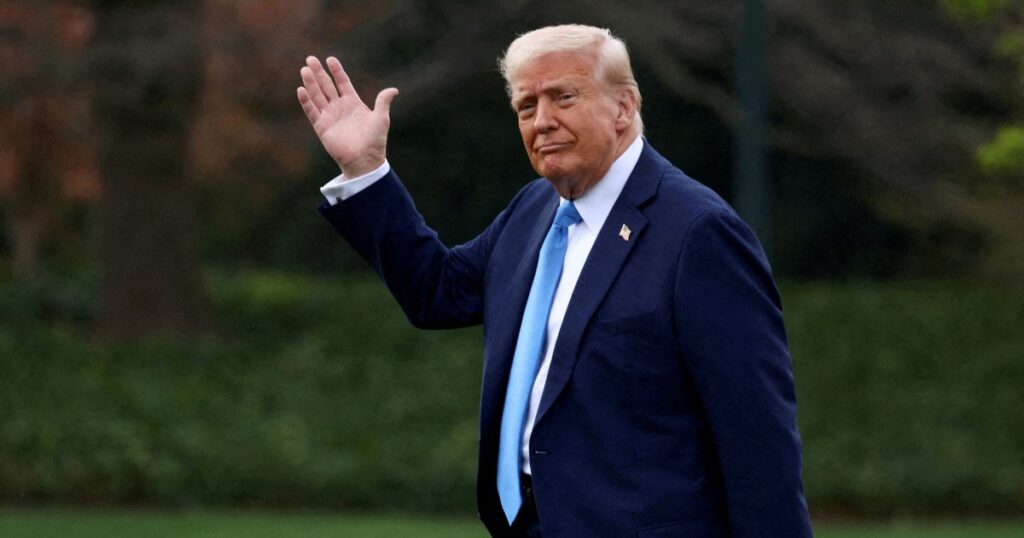
Donald Trump hints at exploring paths to a third term as United States president despite constitutional limits. US President Donald Trump has said he is “not joking” about seeking a third term in office, which is barred by the US Constitution. Speaking in a phone interview with NBC News on Sunday, Trump directly addressed speculation over a potential third term, saying, “No, I’m not joking. I’m not joking,” but added, “It is far too early to think about it.” “There are methods which you could do it, as you know,” he said, without elaborating on potential legal or political avenues. The US Constitution’s 22nd Amendment limits presidents to two four-year terms, whether consecutive or not. The 22nd Amendment says “no person shall be elected to the office of the president more than twice”. Trump was asked in the NBC interview about a scenario where his running mate, Vice President JD Vance, could assume office before stepping aside to allow him to take over. Trump acknowledged the possibility, stating, “That’s one” approach. “But there are others, too,” he added, hinting at alternative strategies without elaborating further. Advertisement ‘We’re working on it’ Overturning this amendment would require a two-thirds majority in both houses of Congress and ratification by three-quarters of the 50 US states. Trump, who began his second, non-consecutive term in January, has repeatedly alluded to extending his time in office. Some of his allies have also floated the idea of keeping him in power beyond 2028, while Trump himself has occasionally teased about the possibility, often in ways that taunt his political opponents. If he were to pursue another term in the 2028 election, Trump, who was the oldest president to be inaugurated in the US in January 2025, would then be 82 years old. The precedent of a two-term limit dates back to 1796, when George Washington voluntarily stepped down after two terms. This tradition remained largely unchallenged for over 140 years until Franklin D Roosevelt won a third term in 1940 amid the Great Depression and World War II. Roosevelt died months into his fourth term in 1945, prompting Congress to formalise term limits with the 22nd Amendment in 1951. Longtime Trump adviser Steve Bannon suggested in a March 19 interview with NewsNation that Trump may seek re-election in 2028. “We’re working on it,” Bannon said, adding that his team was exploring ways to reinterpret the definition of term limits to facilitate a third term. Adblock test (Why?)
Foreign aid rushed to quake-hit Myanmar as more than 1,600 killed
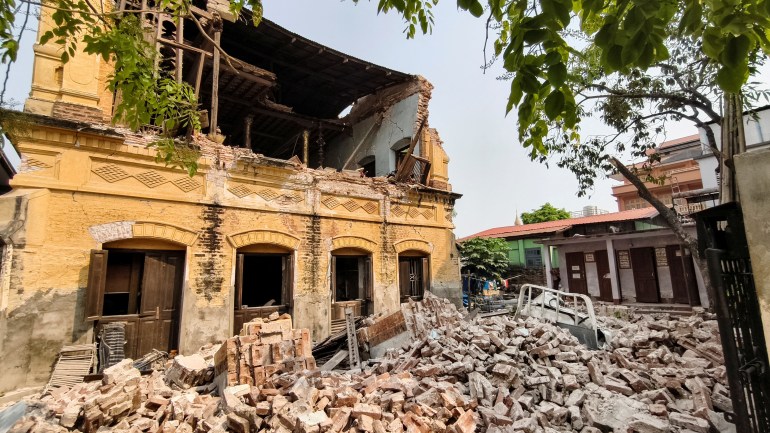
Foreign rescue teams and supplies have arrived in Myanmar to help the impoverished country cope with a magnitude 7.7 earthquake that killed more than 1,600 people and left thousands wounded. The deadly quake, followed by a second magnitude 6.4 tremor, hit midday on Friday with an epicentre near Mandalay, the country’s second-largest city, bringing down dozens of buildings and damaging infrastructure, such as the airport. Myanmar’s neighbours – including India, China, Malaysia, and Singapore – dispatched aircraft and warships carrying relief supplies and rescue teams. Thailand, where at least 17 people died due to the earthquake, also sent aid to Myanmar. A view shows debris next to a damaged building in Mandalay, Myanmar [Reuters] On Sunday, a convoy of 17 Chinese cargo trucks carrying critical shelter and medical supplies was expected to reach Mandalay, after making the arduous journey by road from Yangon. Beijing said it sent more than 135 rescue personnel and experts along with supplies such as medical kits and generators, and pledged about $13.8m in emergency aid. Two Indian C-17 military transport aircraft were able to land late on Saturday at Naypyidaw with a field hospital unit and some 120 personnel, who were then to travel north to Mandalay to establish a 60-bed emergency treatment centre, India’s Ministry of External Affairs said. Advertisement Russia’s Ministry of Emergency Situations said it had flown 120 rescuers and supplies to Yangon, and its Ministry of Health said Moscow has also sent a medical team. (Al Jazeera) The World Health Organization said it was mobilising its logistics hub in Dubai to prepare trauma injury supplies. The global health body said it was coordinating its earthquake response from its Geneva headquarters “because we see this as a huge event” with “clearly a very, very big threat to life and health”. The United States, the European Union and the United Kingdom also sent emergency aid. Meanwhile, an initial report on earthquake relief efforts issued on Saturday by the United Nations Office for the Coordination of Humanitarian Affairs (OCHA) warned that “severe shortage of medical supplies is hampering response efforts.” ‘No aid in sight’ “All military and civilian hospitals, as well as healthcare workers, must work together in a coordinated and efficient manner to ensure effective medical response,” Myanmar’s military leader Min Aung Hlaing said, according to state-run media. But in some of Myanmar’s hardest-hit areas, residents told the Reuters news agency that government assistance was scarce so far, leaving people to fend for themselves. The entire town of Sagaing near the quake’s epicentre was devastated, resident Han Zin said. “What we are seeing here is widespread destruction – many buildings have collapsed into the ground,” he said by phone, adding that much of the town had been without electricity since the disaster and that drinking water was running out. Advertisement “We have received no aid, and there are no rescue workers in sight.” In Mandalay, a rescue worker told Reuters most operations were being conducted by small, self-organised resident groups that lack the required equipment. Meanwhile, a magnitude 5.1 earthquake hit near Mandalay, the US Geological Survey said, with no casualties reported so far. Al Jazeera’s Tony Cheng, reporting from the city, said many people slept outside on Saturday night, fearing even brief aftershocks could collapse already severely damaged buildings. “People are choosing to sleep either on the streets next to their houses or in tent cities, gathered together for comfort.” Adblock test (Why?)
From beats to ballots: What political rap lyrics tell us
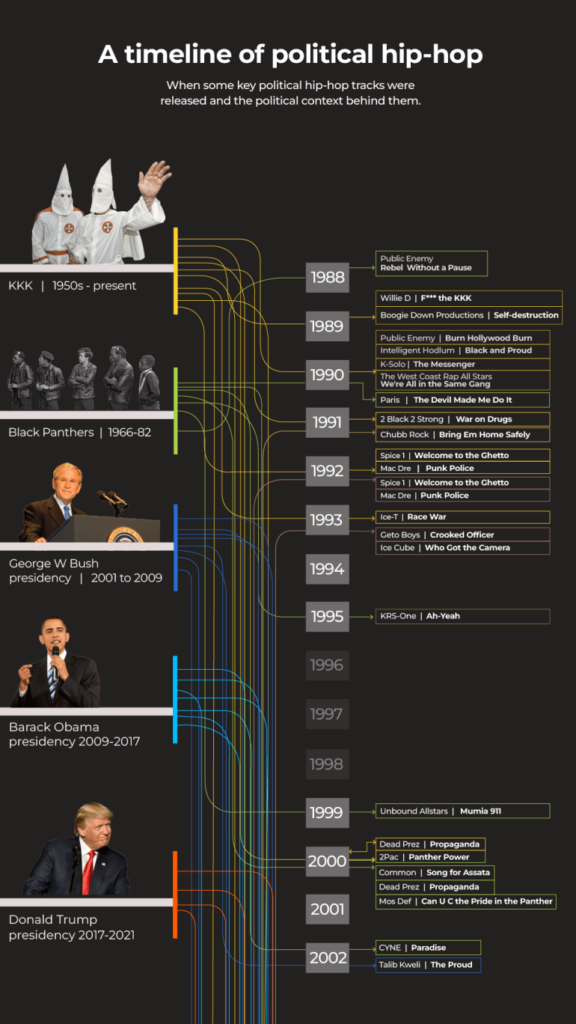
What role has hip-hop played in activism? From the 1980s, hip-hop has essentially enabled marginalised voices to break through to the mainstream. The song Girl (Cocaine) That’s Your Life, released by Too Short in 1985, explores the gritty reality of a woman entrenched in street culture, examining her daily struggles, difficult decisions, and the inevitable repercussions of her chosen lifestyle. Since age thirteen what have I seenA lotto of base heads straight coke fiendsSnorting, puffing, that’s the lifeBut it’s all over when you hit that pipe “We [the Black community in America] were getting these first-person narratives from voices that were not in the mainstream. The voices of the unheard were speaking through rap. Instead of rioting they now had a platform to express themselves,” explained Arnold. In 1987, New York hip-hop rap group Public Enemy, known for raising political issues, media manipulation, and systemic racism in their lyrics, released their debut album, Yo! Bum Rush the Show. The group’s subsequent album, It Takes a Nation of Millions to Hold Us Back (1988) established its legacy in both musical achievement and social advocacy. In Compton, California, N.W.A (Niggaz With an Attitude) release of F**k the Police, which featured on its 1988 album Straight Outta Compton, addressed systemic issues of police brutality and racial profiling. F–k the police comin’ straight from the undergroundA Young nigga got it bad ’cause I’m brownAnd not the other colour so police thinkThey have the authority to kill a minority The lyrics prompted widespread outrage among conservatives, culminating in the FBI sending a formal letter of condemnation to N.W.A’s record label regarding the song’s perceived anti-law enforcement message. Even non-political rappers began to incorporate political messages into their songs, said Arnold, demonstrating how deeply political discourse had permeated hip-hop culture. This influence was so pervasive that artists with no explicit ideological stance found themselves engaging with political themes. “There are only a few artists and groups who are political ideologues. Everything else is occasional political commentary,” said Arnold. “In terms of political ideology, you have Public Enemy, Paris, the Coup, maybe Boogie Down Productions, in the late 80s, early 90s. In the early 2000s, you have Dead Prez and Immortal Technique. On top of that, you have Ice Cube developing a political consciousness that’s evident on his first and second solo albums but then fades into the background on subsequent albums.” Which major incidents have inspired political hip-hop lyrics? One was the 1991 acquittal of four White Los Angeles police officers who had been videotaped severely beating Rodney King, a Black man. The verdict led to six-day-long riots in Los Angeles, resulting in more than 60 deaths, 12,000 arrests and almost $1bn in property damage. The incident inspired Ice Cube to write the song We Had to Tear This Mothaf**a Up, which was released on his 1992 album, The Predator: Not guilty, the filthy, devils tried to kill meWhen the news get to the hood the ni**as will beHotter than cayenne pepper, cuss, bustKickin up dust is a must His former N.W.A. rap mate, Dr Dre, also released a response to the LA riots in his 1992 album The Chronic, The Day the Nig**az Took Over: Mi not out for peace and mi not Rodney KingDe gun goes click, mi gun goes bangDem riot in Compton and dem riot in Long BeachDem riot in L.A. ’cause dem no really wanna seeNiggas start to loot and police start to shoot The first line explicitly rejects calls for peace and expresses the frustrations of the Black community. King himself took a more conciliatory tone during a news conference on May 1, 1992, during the riots. Hoping to quell the violence, he famously stated: “Can’t we all just get along?” “Police brutality is a theme. It’s not just one thing, it’s not just: Oh, Rodney King got beat up. All of these people got beat up. They’re still getting beat up. And it didn’t end in 1992,” said Arnold. Another incident which inspired lyrics was the fatal shooting of Trayvon Martin by George Zimmerman, a neighbourhood watch volunteer in Sanford, Florida, in February 2012. The following year, Zimmerman was acquitted. The shooting ignited national outrage, raising intense discussions about racial profiling, gun control legislation, and Florida’s controversial “Stand Your Ground” law. Hip-hop rapper Plies, who co-founded the independent label Big Gates Records, released We Are Trayvon in 2012, promoting the Trayvon Martin Foundation started by Trayvon’s parents with the goal of raising awareness about gun violence. I never thought that wearing no hoodie, could cost you your lifeAnd I never thought you could just kill somebody and go out the same night. (same night)Every dog that you see that bark, don’t mean that he biteAnd everything that’s Black ain’t even, everything that’s pure ain’t white [embedded content] In 2014, 17-year-old Laquan McDonald was fatally shot by Chicago Police Officer Jason Van Dyke. Police dash-cam footage later emerged, revealing that McDonald had been walking away from Van Dyke when the officer fired 16 shots at the teenager. The withholding of this video evidence triggered huge demonstrations and public outcry. Two years after the incident, rapper Vic Mensa released 16 Shots: He never had a chance, and we all know it’s cause he BlackShot ’em sixteen times, how f*cked up is that?Now, the police superintendent wanna double backCops speeding up to the block like a running back Officer Van Dyke was found guilty of second-degree murder and 16 counts of aggravated battery in 2018 but was released in 2022 after serving three years of his sentence. In 2015, Sandra Bland, a 28-year-old African American woman, was pulled over by law enforcement in Prairie View, Texas. What began as a routine traffic stop for failing to signal a lane change quickly spiralled into a confrontation that resulted in her arrest on charges of allegedly assaulting a police officer. Three days later, officials discovered her lifeless body in her cell at Waller County Jail. Although authorities determined she died by suicide through hanging,
‘Eid of Sadness’: Gaza marks festival amid Israeli bombings, lack of food
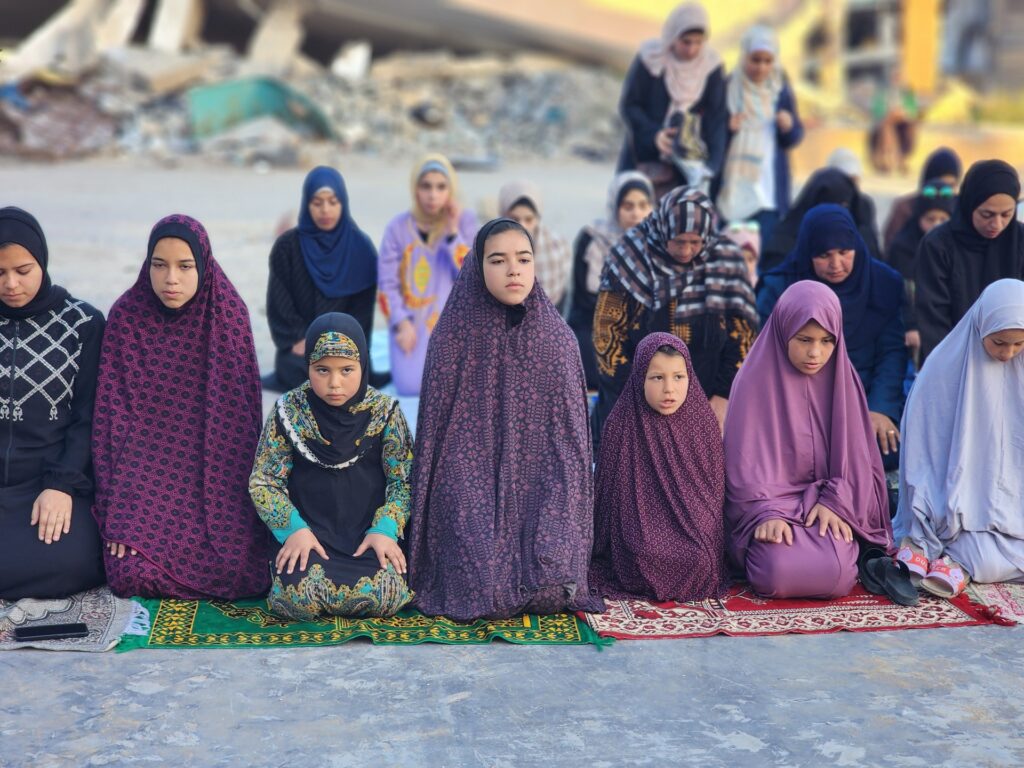
Palestinians in the Gaza Strip had little to celebrate as they marked Eid al-Fitr with rapidly dwindling food supplies and no end in sight to the Israeli bombardment. Many held prayers outside demolished mosques on the day marking the end of the fasting month of Ramadan, as at least 20 Palestinians were killed on Sunday, most of them women and children. The Muslim festival is supposed to be a joyous occasion, when families gather for feasts and buy new clothes for children – but most of Gaza’s two million Palestinians are just trying to survive. “It’s the Eid of Sadness,” Adel al-Shaer said after attending outdoor prayers in the central town of Deir el-Balah. “We lost our loved ones, our children, our lives, and our futures. We lost our students, our schools, and our institutions. We lost everything.” Twenty members of his extended family have been killed in Israeli attacks, including four young nephews just a few days ago, he said as he broke into tears. On March 18, Israel abruptly ended a fragile two-month ceasefire as it resumed its intense bombing campaign and ground operations in Gaza. Israel has since killed hundreds of Palestinian civilians and has allowed no food, fuel or humanitarian aid to enter for four weeks. Advertisement Arab mediators are trying to get the truce back on track, and Hamas said on Saturday it had accepted a new proposal from Egypt and Qatar, the exact details of which were not immediately known. Israel said it had advanced its own proposal in coordination with the United States, which has also been mediating. Israel’s genocide in Gaza has killed more than 50,000 Palestinians, according to the enclave’s Health Ministry. Adblock test (Why?)
Video: Syria forms new transitional government
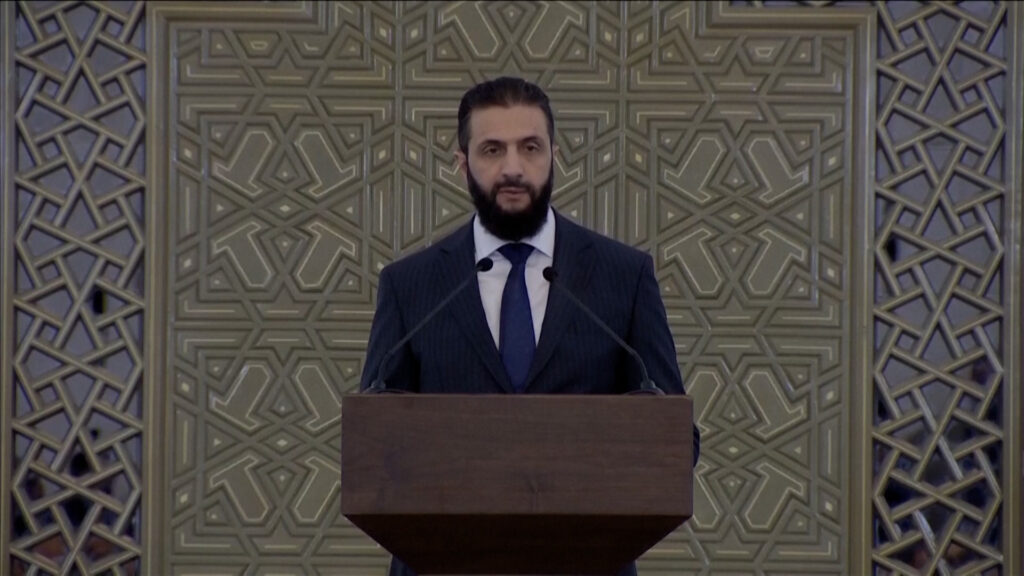
NewsFeed Syria’s interim President Ahmed al-Sharaa has formed a new transitional government tasked with rebuilding state institutions, following the overthrow of Bashar al-Assad in December. The cabinet includes members from Syria’s minority communities, with Alawite, Druze and Christian ministers sworn in. Published On 30 Mar 202530 Mar 2025 Adblock test (Why?)
